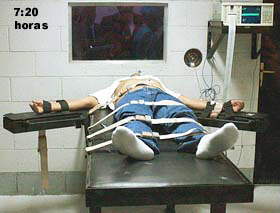 As reported in this morning's New York Times, U.S. District Judge Fernando J. Gaitan, Jr., previously "had demanded an overhaul of the system after the doctor who now mixes the drugs for the state described an improvised process that Judge Gaitan found so chilling that he temporarily barred executions in Missouri."
As reported in this morning's New York Times, U.S. District Judge Fernando J. Gaitan, Jr., previously "had demanded an overhaul of the system after the doctor who now mixes the drugs for the state described an improvised process that Judge Gaitan found so chilling that he temporarily barred executions in Missouri."The nub of the problem, of course, is that "[t]he American Society of Anesthesiologists and the American Medical Association [Op. E-2.06] say physicians should not take part in executions, and Orin F. Guidry, the president of the A.S.A., recently issued a letter to members reiterating that position in light of the Missouri ruling." Dr. Guidry's description of the ASA position on physician participation is a little more nuanced than The Times lets on, but the ASA apparently comes out the same place as the AMA: "ASA does not have a detailed position on anesthesiologist participation in lethal injection but the 2001 House of Delegates 'Approved a recommendation that ASA support the American Medical Association’s position regarding physician nonparticipation in executions.' . . . . Clearly an anesthesiologist complying with the Missouri ruling – and despite this court’s position on ethical obligations - would be violating the AMA position which ASA has adopted. It is my belief that the court cannot modify physicians’ ethical principles to meet its needs."In a sworn deposition, the Missouri doctor, whose name is being withheld by the state, acknowledged that he had sometimes given the condemned a smaller dose of anesthesia — used to reduce the pain of the lethal drugs to come — than the state had said was its policy.
The doctor said he was solely responsible for counting out dosage amounts of the three drugs administered in sequence, knew of no written protocol by the state for carrying out executions and was at times “improvising.”
He also said he is dyslexic, sometimes mixing up phone numbers or cable bill account numbers. “So it’s not unusual for me to make mistakes,” the doctor, identified in court records as John Doe I, said.
He indicated in his testimony, however, that he had made no mistakes in his death chamber work and that the mistakes elsewhere were “not medically crucial.”
Judge Gaitan said he was “gravely concerned” about the doctor’s dyslexia and criticized the lack of “checks and balances,” ruling on June 26 that the state was subjecting the condemned to “an unnecessary risk that they will be subject to unconstitutional pain and suffering when the lethal injection drugs are administered.”
The judge ordered Missouri to hire a board-certified anesthesiologist (John Doe I is a surgeon), and gave the state until today to submit a formal, written set of procedures, including increased monitoring of inmates and an assurance of sufficient anesthetic drugs.
But in the state’s filing last night, officials said they had sent letters to 298 certified anesthesiologists who reside anywhere near the state’s death chamber in Bonne Terre, and were turned down by all of them.
Guidry ends his letter with some blunt observations:
We are being reluctantly placed on a slippery slope. If the courts demand that inmates be sufficiently anesthetized, then I would have to agree with the court that the only way to assure that would be to have an anesthesiologist prepare and administer the drugs, carefully observe the inmate and all pertinent monitors, and finally to integrate all this information. I don’t think that any of us would want to say that untrained individuals under current death chamber conditions can reliably produce a satisfactory level of unconsciousness. Our core skill is that we can induce an appropriate level of anesthesia. Are we willing to say that untrained individuals can also do so with a reasonable degree of success?
However if the only way to accomplish this appropriate level of anesthesia is with an anesthesiologist using all of our tools AND anesthesiologists will not participate, then are anesthesiologists stopping capital punishment and making public policy?
Not in my opinion. Lethal injection was not anesthesiology’s idea. American society decided to have capital punishment as part of our legal system and to carry it out with lethal injection. The fact that problems are surfacing is not our dilemma. The legal system has painted itself into this corner and it is not our obligation to get it out.
1 comment:
what is spirituality If You want to see something great about what is spirituality then you have got to visit http://lifegoalsetting.com/2/index.html
Post a Comment